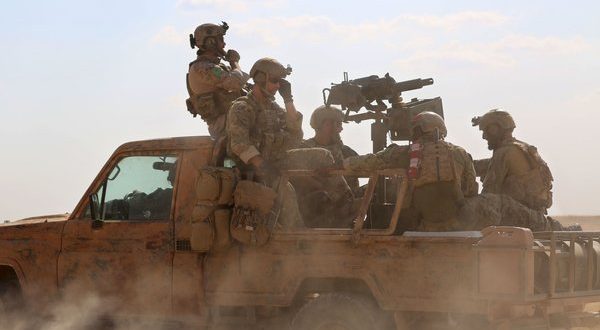June 25, 2017
WASHINGTON — One late afternoon in April, helicopter-borne American commandos intercepted a vehicle in southeastern Syria carrying a close associate of the Islamic State’s supreme leader, Abu Bakr al-Baghdadi.
The associate, Abdurakhmon Uzbeki, was a rare prize whom United States Special Operations forces had been tracking for months: a midlevel but highly trusted operative skilled in raising money; spiriting insurgent leaders out of Raqqa, the Islamic State’s besieged capital in Syria; and plotting attacks against the West. Captured alive, Mr. Uzbeki could be an intelligence bonanza. Federal prosecutors had already begun preparing criminal charges against him for possible prosecution in the United States.
As the commandos swooped in, however, a firefight broke out. Mr. Uzbeki, a combat-hardened veteran of shadow wars in Syria and Pakistan, died in the gun battle, thwarting the military’s hopes of extracting from him any information about Islamic State operations, leaders and strategy.
New details about the operation, and a similar episode in January that sought to seize another midlevel Islamic State operative, offer a rare glimpse into the handful of secret and increasingly risky commando raids of the secretive, nearly three-year American ground war against the Islamic State. Cellphones and other material swept up by Special Operations forces proved valuable for future raids, though the missions fell short of their goal to capture, not kill, terrorist leaders in order to obtain fresh, firsthand information about the inner circle and war council of the group, also known as ISIS.
“If we can scoop somebody up alive, with their cellphones and diaries, it really can help speed up the demise of a terrorist group like ISIS,” said Dell L. Dailey, a retired commander of the military’s Joint Special Operations Command and the chairman of the Combating Terrorism Center at West Point.
The race to drive the jihadists out of eastern Syria, where they have held sway for three years, has gained new urgency as rival forces converge on ungoverned parts of the region. Syrian forces and Iranian-backed militias that support them are advancing east, closer to American-backed fighters battling to reclaim Raqqa. Russia threatened on Monday to target American and allied aircraft the day after the United States military brought down a Syrian warplane.
This highly volatile environment puts an increasing premium on the Special Operations missions.
Despite his nom de guerre, Mr. Uzbeki, 39, was a native of Tajikistan, not Uzbekistan, and honed his fighting skills with the Islamic Movement of Uzbekistan, a Taliban-allied jihadist group, according to an American military official. About 10 years ago, he moved to Pakistan, where he had extensive contacts with Al Qaeda, the official said. In recent years, he had moved to Syria and joined the Islamic State’s fighting ranks.
Mr. Uzbeki was close to Mr. Baghdadi, the Islamic State’s leader, and helped plot a deadly attack on a nightclub in Istanbul on New Year’s Day. He was targeted for his role in the Islamic State’s plotting of attacks around the world, said Col. John J. Thomas, a spokesman for the United States Central Command. “He facilitated the movement of ISIS foreign terror fighters and funds,” Colonel Thomas told reporters in April.
After months of waiting for an opportunity to seize Mr. Uzbeki without putting civilians at risk, one arose on April 6 for the so-called expeditionary targeting force, a group of commandos from the secretive Joint Special Operations Command who hunt Islamic State leaders in Iraq and Syria
About 3 p.m., Mr. Uzbeki was driving from Mayadeen, a city in southeastern Syria that has become an enclave for Islamic State leaders fleeing Raqqa. (The Central Command said this past week that it had killed Turki al-Bin’ali, a senior recruiter and propagandist, in an airstrike on May 31 in Mayadeen.)
So successful was that raid that seven months later, Ashton B. Carter, then the defense secretary, disclosed at a House hearing that he was creating a “specialized expeditionary targeting force.”
“As Mosul and Raqqa come under increasing pressure, we’ve seen ISIS elements moving into the Euphrates River Valley over the past few months,” said Cmdr. William Marks, a spokesman for the Defense Intelligence Agency.
Mr. Uzbeki had just dropped off a higher-ranking Islamic State leader in Mayadeen and was returning to Raqqa when the commandos ambushed him. Though he died, the soldiers were able to recover cellphones and other materials, a military official said.
In a similar raid in early January, American commandos killed another midlevel Islamic State leader they had been trying to capture and interrogate in the eastern Syrian province of Deir al-Zour, which is largely under Islamic State control. The insurgent, whom the military did not identify, was also killed when he resisted capture. Important information was also collected from this raid, military officials said.
The model for these kinds of operations in Syria emerged in May 2015 when two dozen Delta Force commandos entered Syria aboard Black Hawk helicopters and V-22 Ospreys from Iraq and killed Abu Sayyaf, whom American officials described as the Islamic State’s “emir of oil and gas.”
The information harvested from the laptops, cellphones and other materials recovered in the raid yielded the first important insights about the Islamic State’s leadership structure, financial operations and security measures.
Equally important, Abu Sayyaf’s wife, Umm, who was captured in the operation, provided information to investigators for weeks, American officials said, before she was turned over to the Iraqi authorities.
The commandos — initially numbering about 100 troops, including support personnel — would have a mission similar to, but smaller than, the one they carried out in tandem with President George W. Bush’s surge of American troops in Iraq in 2007. There, commandos conducted a series of high-tempo, nightly raids to capture or kill fighters from Al Qaeda and other former Baathist groups in Iraq.
In recent months, the targeting force has intensified its drone strikes and raids in Syria against the Islamic State’s external operations planners, who have inspired, supported and directed attacks beyond their declared caliphate and into the West. A small number of capture missions are in the works, tracking insurgent leaders, military officials said.
“When the target is indeed captured alive, then we often can get even more valuable information through interrogations, immediate and continuing over time,” said William Wechsler, a former top counterterrorism official at the Pentagon. “All of this helps us better understand the enemy network, prioritize new targets, and identify external terrorist plots.”
 Agoraleaks Agoraleaks
Agoraleaks Agoraleaks







